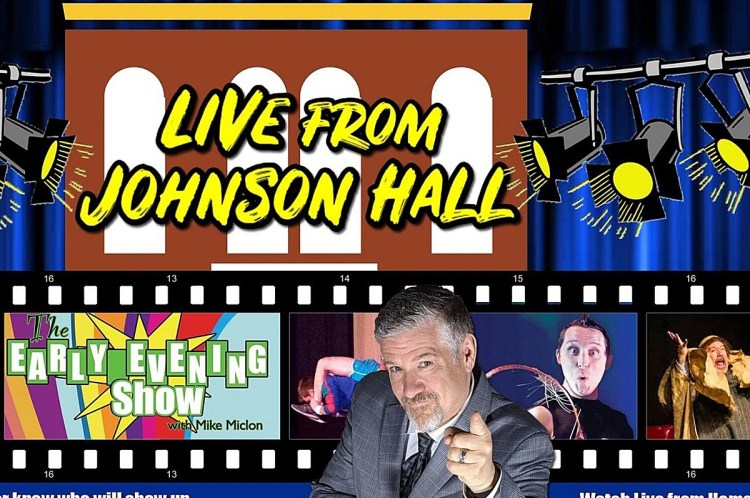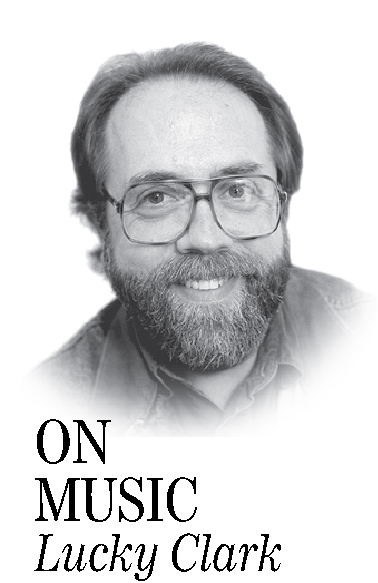In an effort to get a handle on what’s been happening in the world of music in Maine over the last year, I’ve conducted several interviews with venue directors and owners (like Carol Noonan of Stone Mountain Arts Center and Stacy O’Brien of Somerset Abbey). I decided a chat with Michael Miclon, executive/artistic director of Johnson Hall, would be the next logical person to contact, so a phone interview was arranged.
Q: The parameters of this conversation are a look back at last season and how Johnson Hall dealt with the pandemic’s restrictions, and what you have coming up. Does that work for you?
Miclon: Yeah. So basically, starting in March of last year we started doing all online shows — we did all livestreaming shows from Johnson Hall.
Q: How did that work?
Miclon: We’d bring artists into our space, we’d do a three-camera shoot — all HD, high-quality — then we’d broadcast it. People buy a link, we send them a password to the link the day of the show and they can view the show up to a week after. The first show that we did was so spectacular, I did my “Early Evening Show”— my late-night talk show spoof — and we had 300-plus ticket purchases from five countries, 20 states and 117 cities in Maine (laughter)!
Q: Good grief!
Miclon: Yeah, it was insane. We made over nine grand in one show, which is a high for any show that we do, so we were like, “This is going to be spectacular!” and then it was like a steady decline after that. The winter months did okay but the summer months, we tried to run through the summer, which we don’t normally do anyway, and I think people were just like, “We want to be outdoors.” Once we hit October, it started to get a little better and a little bit better and a little bit better, so we were hoping we’ll recapture that; but that’s been our more and our plan is to just keep offering at least two online shows per month and just keep our audience connected even in a small way.
Q: Now, the ticketing process, how does that work out?
Miclon: Normally a couple might come to a show here and they’d buy two tickets, but they only need to buy a single ticket (for the online show) and they can watch with their whole family.
Q: Oh, that’s right.
Miclon: Yeah, it’s hard to make the economics work of it, but the main goal for us is to just not disappear.
Q: Were you able to tap into the PPP, the Paycheck Protection Program?
Miclon: We did; we were able to get that on both rounds so we were able to keep our full staff working. We’ve been able to keep everybody employed, keep everything going and hanging in there. We’re really crossing our fingers that we might be able to do waterfront concerts — if they’re outdoors and socially distanced — and then maybe by sometime in the fall or late fall, maybe be able to start to invite people back inside again, we’re really very anxious for that. In September, we actually had one show on the third floor of Johnson Hall that had 25 people, plus we did the livestream, and it was the only show that we’ve done since March that’s actually had a live audience, which was wonderful.
Q: I bet it was.
Miclon: (Chuckle) I realized how much I just missed that so much.
Q: Well, at least with a live audience, no matter how small, you can get some kind of reaction from it, where if you’re just streaming you don’t know how it’s going over.
Miclon: Exactly. I mean, when you’re doing comedy it’s insane to try and play … you’re used to waiting for the laugh and you can’t because if you do it creates these weird, awkward pauses where you have to go, “I just have to trust that was funny.” And even the musicians will tell you that it’s fun to play together and make great music but it’s really hard with no audience feedback whatsoever.
Q: In one of the conversations I’ve had recently with an artist who has been doing livestreaming exclusively, she declared that though she couldn’t wait to get back to in-person shows, she also wants to keep her livestream audience, as well. I guess this is just another tool in performers’ toolboxes.
Miclon: I think it will be, yeah, and I think that’s what we’re going to look to do … sort of a hybrid system as we slowly open back up again. And then we’ve been building this livestream audience, so it creates this really interesting dilemma of going how much do we want to keep feeding that audience (chuckle) . We have a guy from Amsterdam that knew somebody in one of the shows we did but he’s continued to keep watching our livestreamed shows from Amsterdam … a fan in Amsterdam — who knew, right?!
Q: And that hybrid you mentioned earlier with a partial audience and livestreaming, that might be something you could ride back into normalcy.
Miclon: Right!
Q: Now what does this upcoming season look like to you?
Miclon: Well, right now it’s a mixture of mostly music, because music seems to translate the best to the livestream world. I’m continuing to do my “Early Evening” shows probably every other month because they are larger: I have a band and I have other performers, and we can play off each other. But it’s unfortunate; we had a great stand-up comedy series and improv shows that were really picking up steam, and without some audience it’s not remotely possible.
Q: So the bottom line is … ?
Miclon: Basically, right now we’re planning two shows a month and on average most of them will be music, and then sprinkled in will be my “Early Evening” shows every other month or so. And we’re trying to see if we’ll be able to do our Waterfront Concert Series because that was sorely missed last year. … Outdoors, there are more possibilities for correct social distancing and we’d really have to still make sure that people wear masks and do all that stuff, but it would be so lovely to have waterfront concerts again.
Q: Is there anything, Mike, that you’d like me to pass on to the folks reading this article?
Miclon: Well, we have a show on March 20th with a singer-songwriter named Barney Martin.
Q: Is there anything else that you’d like to add — this is your forum, after all.
Miclon: That’s sort of the big news is that we’re going to keep trucking and hopefully get the waterfront concerts and then hopefully partially get back on track. That’s our working model right now.
Lucky Clark has spent over 50 years writing about good music and the people who make it. He can be reached at luckyc@myfairpoint.net if you have any questions, comments or suggestions.
Comments are not available on this story.
Send questions/comments to the editors.



